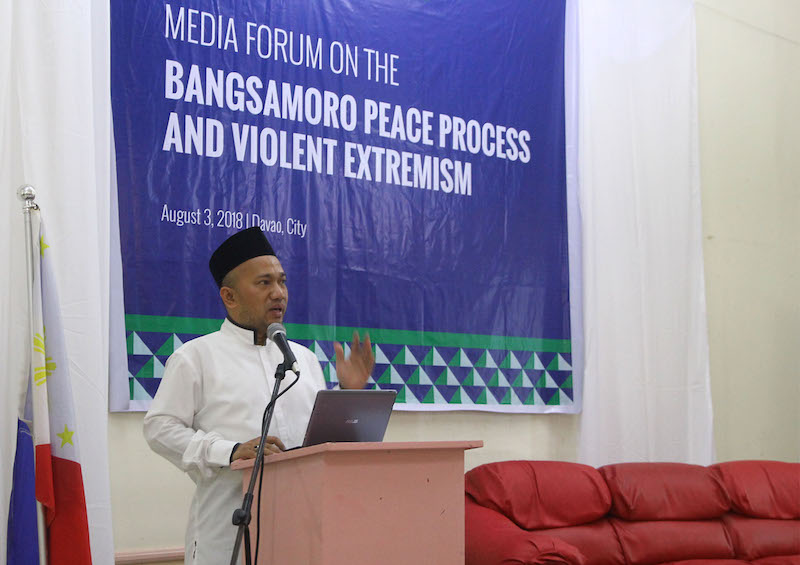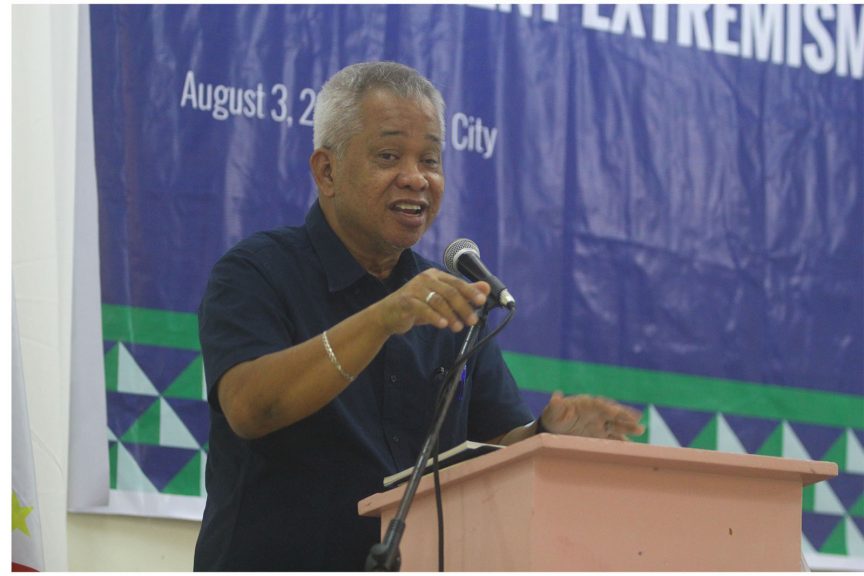DAVAO CITY (MindaNews / 05 August) — A university professor here said it is “fatally wrong” to assume that the newly-signed Organic Law for the Bangsamoro Autonomous Region in Muslim Mindanao will be the only solution to the armed conflicts in what is presently referred to as the Autonomous Region in Muslim Mindanao (ARMM) because a long-term problem will take some time to heal.
“It is never to be the panacea to the problem and those who claim the Bangsamoro Organic Law, or Bangsamoro Basic Law before, is the panacea is fatally wrong. A long-term problem would also take a long time to address the different dimensions of the problems,” Dr. Mansoor Limba, associate professor of political science and international and Islamic studies at the Ateneo de Davao University, told the media forum on the Bangsamoro Peace Process and Violent Extremism at the Linmarr Hotel here on Friday.
 Dr. Mansoor Limba tells a media forum on 03 August 2018 in Davao City that violent extremism “is both an illness and symptom of illnesses.” MIndaNews photo by GG Bueno
Dr. Mansoor Limba tells a media forum on 03 August 2018 in Davao City that violent extremism “is both an illness and symptom of illnesses.” MIndaNews photo by GG Bueno
Limba, a research fellow at the Al-Qalam Institute for Islamic Identities and Dialogue in Southeast Asia, explained that addressing violent extremism depends on how the new government of what will be referred to as the Bangsamoro Autonomous Region in Muslim Mindanao (BARMM) would deal with its “drivers or enablers” which are indicative of social illnesses such as poor governance, corruption, social disenfranchisement, and historical injustices.
“Violent extremism, as you may agree, is both an illness and symptom of illnesses. It is an illness in itself because it is a sign of intolerance, it is a sign of religious extremism or political extremism, it is also a symptom of other social illnesses,” he said.
If the social illnesses would be addressed, he said the “possibility of incidents of car bombings and suicide bombings would be less if not totally eradicated” but the possibility would also be high if the government would fail to address the root causes of violent extremism.
Bangsamoro Autonomous Region
Commissioner Jose Lorena of the Bangsamoro Transition Commission (BTC) said “the BARMM is better than the ARMM.”
The Bangsamoro region, he noted, is very rich in resources but it remains poor because it is wrought with armed conflicts, displacing residents from their farmlands to evacuation centers.
 Commissioner Jose Lorena Jr. during the Media Forum on the Bangsamoro Peace Process and Violent Extremism in Davao City. August 3, 2018. MindaNews photo by GG BUENO
Commissioner Jose Lorena Jr. during the Media Forum on the Bangsamoro Peace Process and Violent Extremism in Davao City. August 3, 2018. MindaNews photo by GG BUENO
He added public investment has been short in the Bangsamoro, making it unattractive for private investments.
He said the Bangsamoro government, which would have a parliamentary system, would be more conducive to effective governance than a unitary system because the leader is directly accountable to the representatives of the people in the parliament.
“For a good leader, three years is too short. For a bad leader, three years is too long. And the problem of governance in the unitary system, even if you have a governor who stays two years in Manila without coming to ARMM, you cannot remove him because he has a term of office,” he said.
He explained that limited timeframe makes the process of impeachment nearly impossible.
He added that in a parliamentary system, a leader can be removed from office if he fails to govern well.
“If he does not govern well, by a vote of no confidence, he can be removed anytime. If you view it from the context of government, (it) should not only be an employment agency but it should also be an effective model for governance and as an economic model,” he added.
Lorena added that the Bangsamoro government is given subsidiarity, allowing them to address the internal issues by themselves.
He explained that a solution provided without knowing the context of the problem will not be very effective.
“Subsidiarity is a concept common to all of us. If I have a problem with my wife in the house we should be the one who should solve the problem because we know the problem well. We should not allow somebody from the outside to provide the solution for all our problems,” he said.
He said the purpose of the Bangsamoro law is to establish a political entity that actually provides for basic structure in recognition of the justness and legitimacy of the cause of Bangsamoro but within the context of 1987 Philippine Constitution and within the context of Philippine sovereignty and territorial integrity.
The Bangsamoro would cover the ARMM which comprises the provinces of Basilan, Lanao del Sur, Maguindanao, Sulu, and Tawi-Tawi and cities of Lamitan and Marawi.
Lorena explained six municipalities of Lanao del Norte and 39 barangays in North Cotabato would be given a second chance to decide whether or not to join the Bangsamoro territory.
He added that these areas voted yes to inclusion in the ARMM in the plebiscite in 2001 but were not incorporated because of a “technical glitch” in R.A. 9054, an act strengthening and expanded the Organic Act for the ARMM, which failed to specify municipalities and barangays as geographic areas.
“To correct the glitch of the past, those municipalities who voted in the past to join should be given the second opportunity to say so, whether they want to be part of autonomy or not,” he added.
The law provides for a double majority: the six towns of Lanao del Norte and 39 barangays in North Cotabato will be included in the Bangsamoro region if they vote yes in the plebiscite and if their mother units — Lanao del Norte and the municipalities in North Cotabato where the barangays belong — also vote yes. (Antonio L. Colina IV / MindaNews)
